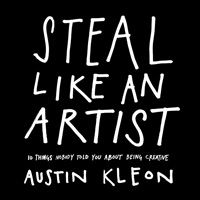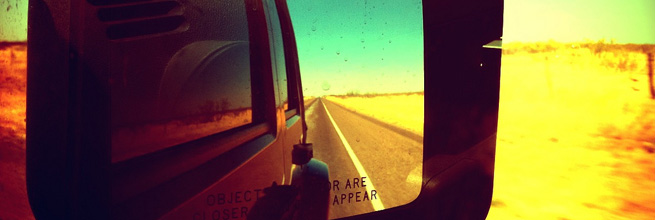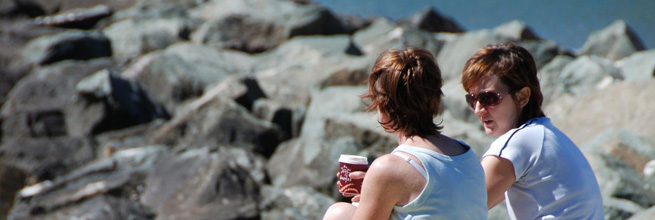–or, A Fan Letter to Austin Kleon–
Austin Kleon came to town a couple weeks ago, one of the first handful of stops on his book tour for his second release, Steal Like an Artist. The Right Brain Initiative of Portland's Regional Arts and Culture Council collaborated with PNCA to bring him here, and his presentation was hosted at the Museum of Contemporary Craft (you can listen to the podcast on PNCA's Multimedia Archive).
This was of particular interest to me for a couple reasons. First, I had heard about the birth of Steal Like an Artist shortly after it went viral on the Internet—he had simply blogged about a recent speaking engagement at a community college, and the post had been retweeted down a graphic design–centric chain to my own circle. Shortly thereafter, I heard about the book deal he scored from the publicity, and thought, "Awesome! More power to him."
The second reason that perked my ears up was that The Right Brain Initiative was bringing him to speak right into the Museum, where my office currently resides. I only had to walk about 100 feet to the Museum's gathering space to hear the man talk. As it turns out, a twist of fate led me to welcome the audience gathered at the first of two appearances that day, so I felt extra special.
Naturally, I purchased his book on the spot, asked for an autograph, and merrily brought it home to add it to my ever-growing pile of books to read. I would soon learn through Mr. Kleon, much to my delight, that John Waters has said, "Nothing is more important than an unread library."
Steal Like an Artist is approachable and easy to read. I was pleased to note that it spoke not just to artists, but to anyone imbuing creativity into what they do (which, in my mind, should be everyone). The format, a small-ish black and white square littered with his own handwriting and illustrations, balances the relatively sparse text and encourages you to keep going. I read the entire thing in one sitting on a flight to Chicago, and still had plenty of time to jot down some thoughts, proofread an essay, and start reading a second book. Well worth your time, and nothing the worse for its brevity.
All Advice is Auto-Biographical
Kleon starts the book off by framing all advice, and thus his, as auto-biographical, complete with a wonderfully glum photo of his 19-year-old self slumped over a laptop, cigarette hanging out of his mouth. His primary audience is himself, a dozen or so years earlier, and with good cause. As unique human beings, our individual life perspective is, well, unique.
Sure, we may be eager to share our thoughts with the world, and sure, we might have something to say that will speak to certain people with shared traits, interests, and experiences. But advice really just offers a retrospective of our own lives to our younger counterparts, and it just so happens to be shared in a public space. After all, DeLoreans are pretty hard to come by these days.
And since time travel is not yet an option, the best we can do is hope to get the word out to our peers about what worked and what didn't, in an effort to help them avoid the same mistakes and celebrate the same successes that we felt in our youth. The truth is—and this comes down to what Kleon emphasizes at the end of the book—your mileage may vary. And that's the joy of it. Here are some of the other topics that stood out to me.
Write the Book You Want to Read
Fiction authors often cite "write what you know" as the secret to a good book, but Kleon disagrees, and I'm on his side of the fence. Writing is as much about self-discovery and development as it is about teaching people. When we focus on what we are interested in, our passion shines through in our words. We may start with something we know, but often we find ourselves staring at a whole lot of what we don't know, which leads to a lot more research and writing about what we are just about to discover.
The other key is not writing what you think people want to hear. The beauty of avoiding this is that when we write what we like and what we're interested in, people are more likely to connect on a personal level. It's more human when they can find shared experiences and knowledge in another person's interests. (Les Edgerton writes in Hooked that non-fiction outsells fiction about ten to one. Why connect to a fake person when you can connect to someone real?)
Productive Proscrastination
There's a website here in Portland called I Live Here:PDX that profiles Portland residents with a number of interview questions ranging form the number of tattoos one has to their favorite coffee roaster. But one of my favorite questions is "What's your slash?"—the common notion that the residents of such a creative city are always leading some sort of double/triple/quadruple life. The classic hipster example: a Stumptown barista by day plays bass in an up-and-coming band by night but is really trying to make a name for themselves as freelance food critic. (Please forgive the eye roll.)
Kleon talks in this vein about side projects—taking advantage of the off hours to moonlight, explore something new, and express yourself in some creative form or another. I think this is really important, and the barista/bassist/foodie would undoubtedly agree. My own side projects have included Focal Length Designs, I Heart Art: Portland, and, well, this here blog, to name a few. So what's my slash? I'm a project manager/community organizer/creative business writer/customer support specialist… to name a few. What's yours?
Embrace the side project, even if it's not something with which you're trying to make money. Find a good cause you can get behind, knit while you're watching TV, or design that electronic device you've always dreamed about. It keeps your brain churning out ideas that don't relate to whatever your day job may be. And who knows? It could lead to the next big thing and free to you pursue your dream before you know it.
Do Good Work and Share it with People
I think this dovetails really nicely with what I heard Chris Guillebeau say at a recent CreativeMornings talk. He touched on two major rules in life:
- Help Someone
- Make Something
Both couplets are tied to each other in my mind. Make something, but do good work—make sure you've made it the best it can be. If we aren't striving for quality and craft in what we do (from jewelry design to an app's interface to a properly proofread blog post), then we might as well spend $4,000 on a three-year-old's crayon drawings and settle on it as fine art.
Likewise, when we make something we should share it with others and in the process help them. Helping does't necessarily need to be charity work or walking an elderly woman across the street. It could be as simple as helping someone better appreciate the work that you do or solving a common frustration among your peers. As long as we have a sense of community that relates to our desire to make things, we are on the right track.
Enjoy Captivity
Turn off, tune out, and put it away. I've already stepped up on the email soapbox, and I just wrote about Productive Isolation (which, incidentally, was when I read this book and latched onto the idea), so I'll just say that we need to make time to switch off the digital distractions and hyper-focus on something analog now and again.
[Don't] Keep Your Day Job
So here's a point in Kleon's guide where I disagree and where I think our mileage should vary. He leads into this brief section with this:
The truth is that even if you're lucky enough to make a living off doing what you truly love, it will probably take you a while to get to that point. Until then, you'll need a day job.
First, I think that everyone deserves to make a living doing what they love, not just a lucky minority. If we're going to follow our passions in our side projects, they should somehow guide us toward something better than a day job.
Second, I think we spend too much time wishing we had more time to focus on what we love, and we let the day job eclipse that in importance because that's what's paying the bills. How many people have you heard of who have said that getting laid off during the recession was the best thing that had happened to them? They channeled their unemployed energy and sense of urgency into making something for themselves, and they are often happier for it.
Launching out on your own to follow your dream can be a scary, daunting thing, and I'm not suggesting you quit your nine to five right now and dive into self-employement blindly. I just want to make sure you aren't holding yourself back because of your day job. I've been working on so many side projects lately that I recently calculated how many hours a week I actually have to work outside of my day job. Factoring in meals, personal time and relationship time, I topped out at about 32 available hours per week—far more than enough to pursue something actively on the side which could eventually lead to self-employed freedom. How can you take advantage of those extra hours and make something for yourself?
Get Out of the House
Lastly, enjoying captivity or productive procrastination is essential, but we creatives cannot isolate ourselves in our basement studios or home offices all the time (see DIY Martyrdom). We need to be part of something. We need community. It's important to get out of the house and socialize, to share our experiences with others, give of ourselves and receive of others in return.
Steal Like an Artist is a great primer and helpful reminder for anyone trying to do what they love or express themselves creatively no matter the industry, no matter the job description. It's light-hearted, jam-packed with quotes from Jay-Z to John Cleese, and filled with analog visuals.
It's time to start stealing like an artist. Thank you, Austin, for assuring us that it's okay.
Buy Steal Like an Artist from Powells or IndieBound.
Further Reading: Austin Kleon's website.
Next up on my shelf:
I'm nearly finished with The $100 Startup by Chris Guillebeau, then it's on to Blink by Malcolm Gladwell.
Bookshelf is a series of book reviews and thoughts about what I've read. Some are left-brained books, some are right-brained books, but the best books are the ambidextrous-brained books. Disclosure: most purchase links are created through affiliate programs. If you like what you see here, consider supporting The Ambidextrous Brain by using the links to purchase a book.









